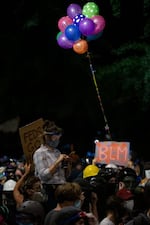
Karina Brown covers the Portland BLM protests for Courthouse News Service
Dave Killen
Note: This story deals with an incident of sexual assault.
Covering protests in Portland is nothing new for Karina Brown. She’s been doing it regularly since Donald Trump was elected president.
What’s unusual is how she reacted to a run-in with law enforcement while covering a Black Lives Matter protest in Portland last month. The incident surfaced a painful memory from high school, when she was raped by her best friend’s father.
She wrote about what happened, and what it did to her emotionally for the Courthouse News Service and spoke this week with OPB’s Geoff Norcross.
Geoff Norcross: “Why don’t you start by telling me about your encounter with law enforcement that night? What happened?”
Karina Brown: “I was covering the protest downtown. I was there for hours, and towards the end of the night, it was about 3:30 in the morning, I got separated from the group of protesters I was covering. There were vans of riot police driving around there, kind of chasing smaller and smaller groups as people split up when they were chased. And all of a sudden I found myself alone as this van chased after me. And I ran. I was running and I could hear it accelerating behind me.
And then I heard these two voices of riot police. They called out together in this singsong voice at the same time. They were like, ‘We’re going to get you.’ I kind of ducked behind this big concrete pillar, which you know, in retrospect, it’s so strange to me to think that I ran and then I hid. I mean, I was out there as a reporter. I should be able to stand and observe what’s happening. But I was scared. And as I hid, they drove past. They didn’t stop, they just continued. But as they drove, one yelled, ‘We still see you.’
And the whole experience ... I didn’t even realize how much it bothered me until after I tweeted about it. I was live-tweeting the whole night, and that was kind of my final sign off, describing that moment and I just said this is what happened, but kind of almost in a joking way. And people started responding, saying, ‘Oh my God, that must have been terrifying! We’re so glad you’re okay!’ Those responses, it was like each one was strengthening. Each one made me think, ‘Oh this was bad. That was really bad.‘”
Norcross: “And it was bad because it kicked up a memory for you. Can you talk about that?”
Brown: “It took a little while to kind of realize. I had the strange weekend of weirdly disassociated behavior of bursting into tears and strange moments, like opening a cupboard door and not really being sure why I did that. And at a certain point, I remember thinking to myself, ‘I know something. What is it that I know?’ That was Sunday afternoon, and that’s when I started to write.
But it took, like, maybe 36 hours after I got home from the protest until I realized that the behavior of those cops ... it kind of echoed, it mirrored an experience I had in high school, a really traumatic experience, where my best friend’s father late at night drove me to an industrial building and raped me. And that night he chased me around the building, and I was terrified. I was utterly terrified and sobbing, and I didn’t know if I would make it out of that night alive. But he chased me around like it was all this big joke. He was laughing, laughing at my fear and that feeling of being afraid of powerful men who have the ability to hurt and kill. And to have the police that night act so callously about holding that power and kind of emphasize it in that way, like grind it in, in the face of someone’s fear of that power. It kind of touched that memory, and I think it kind of enlivened it.”
Norcross: “Why did you want to write about all this?”
Brown: “At first, I just wanted to write about that rage that I saw in some of the protesters and how my experience that night, it transformed my understanding of what they’re doing there or what I see as one reason they might be doing it. And then I realized I wanted to talk about trauma and how normalized trauma and daily violence are. I mean, inflicting trauma is normal and struggling with it or suppressing it is normal. But talking about it is not normal. I mean, honestly, it’s not even really normal, like what I’m doing at this moment, and I’m really interested in how that sets us up to accept larger societal violence. I wanted to talk about how my own experiences with trauma overlap and inform my ability to see the threats to our democracy, my ability to cover that. Because I know I’m not the only one with those experiences who’s trying to report at this moment. And I’m definitely not the only one who’s watching all of this play out and have that touch experiences that you’ve had in the past.”
Norcross: “How are you doing? How are you taking care of yourself these days?”
Brown: “The basics. I try to sleep a lot, as much as possible, and eat well and not drink too much. But I feel like in some ways, I take care of myself through doing my job. Writing is the way I understand the world. I’m so grateful to have a job that lets me engage and like gives me a way to feel useful. Like I have something to contribute. And especially writing this piece. It really helped. I just felt so much better afterward. "
To listen to the entire conversation, use the audio player at the top of this story.
